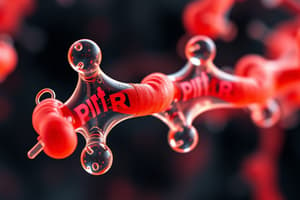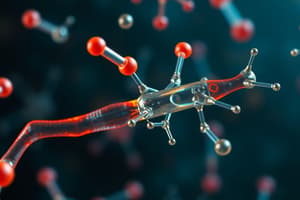Podcast
Questions and Answers
What is the generic name for Dopamine?
What is the generic name for Dopamine?
- Adrenergic-mimics
- IV/IO - drip
- Intropine
- Dopamine Hydrochloride (correct)
What is the trade name for Dopamine?
What is the trade name for Dopamine?
Intropine
What class of drug is Dopamine?
What class of drug is Dopamine?
Adrenergic-mimics epinephrine and norepinephrine, vasopressor, Inotropic agent
What is the primary action of Dopamine?
What is the primary action of Dopamine?
What are the indications for using Dopamine?
What are the indications for using Dopamine?
What is the route of administration for Dopamine?
What is the route of administration for Dopamine?
What are the contraindications for using Dopamine?
What are the contraindications for using Dopamine?
What are some adverse effects of Dopamine?
What are some adverse effects of Dopamine?
What special considerations should be taken into account when administering Dopamine?
What special considerations should be taken into account when administering Dopamine?
What is the dosage range for Dopamine?
What is the dosage range for Dopamine?
Flashcards are hidden until you start studying
Study Notes
Dopamine Hydrochloride Overview
- Generic Name: Dopamine Hydrochloride
- Trade Name: Intropine
Classification
- Adrenergic agent that mimics the effects of epinephrine and norepinephrine.
- Vasopressor that effectively raises blood pressure.
- Functions as an inotropic agent to increase the force and speed of cardiac muscle contractions.
Mechanism of Action
- Enhances cardiac contractility and increases the heart rate.
- Causes constriction of systemic vasculature, resulting in elevated blood pressure.
Clinical Indications
- Used in managing cardiogenic, septic, or distributive shock.
- Effective for hypotension accompanied by low cardiac output.
- Serves as a second-line treatment for symptomatic bradycardia.
Administration Route
- Delivered intravenously (IV) or intraosseously (IO) via drip.
Contraindications
- Not suitable for use in hypovolemic shock.
- Avoid in patients with tachydysrhythmias or ventricular fibrillation.
- Contraindicated in cases of pheochromocytoma (adrenal gland tumor).
Adverse Effects
- Possible side effects include headaches, anxiety, dyspnea, and various dysrhythmias.
- Risk of hypotension, palpitations, chest pain, and increased myocardial oxygen demand.
- Nausea and vomiting may occur, along with tissue necrosis if the intravenous line fails.
Special Considerations
- Dosage for beta effects is between 5-10 mcg/kg/min to enhance cardiac rate and contractility.
- Dosage for alpha effects is between 10-20 mcg/kg/min, promoting vasoconstriction and increasing blood pressure.
- The drug is incompatible with sodium bicarbonate.
- Use of monoamine oxidase inhibitors (MAOIs) can amplify the effects of dopamine.
Dosage Range
- Administered at a rate of 2-20 mcg/kg/min.
Studying That Suits You
Use AI to generate personalized quizzes and flashcards to suit your learning preferences.




